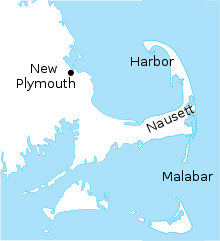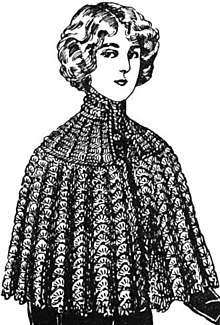cape
English

Pronunciation
- enPR: kāp, IPA(key): /keɪp/
Audio (US) (file) - Rhymes: -eɪp
Noun
cape (plural capes)
- (geography) A piece or point of land, extending beyond the adjacent coast into a sea or lake; a promontory; a headland.
- Synonyms: chersonese, peninsula, point
Derived terms
Translations
|
|
Etymology 2
From French cape, from Old Occitan capa, from Late Latin cappa (“cape”). The second sense s metonymic from the fact that many superheroes wear capes.

Noun
cape (plural capes)
- A sleeveless garment or part of a garment, hanging from the neck over the back, arms, and shoulders.
- 1977, Agatha Christie, chapter 4, in An Autobiography, part II, London: Collins, →ISBN:
- Mind you, clothes were clothes in those days. […] Frills, ruffles, flounces, lace, complicated seams and gores: not only did they sweep the ground and have to be held up in one hand elegantly as you walked along, but they had little capes or coats or feather boas.
-
- (slang) A superhero.
- 2017, April Daniels, Dreadnought: Nemesis - Book One, Diversion Books (→ISBN):
- Rows and rows of booths and pavilions stretch across the floor, draped with glowing holograms and shifting signs beckoning capes to try their wares. Bystander insurance. Hypertech components. Mystical ingredients. Training DVDs ...
- 2017, April Daniels, Dreadnought: Nemesis - Book One, Diversion Books (→ISBN):
Derived terms
- cape for (slang)
Translations
|
|
See also
Verb
cape (third-person singular simple present capes, present participle caping, simple past and past participle caped)
- To incite or attract (a bull) to charge a certain direction, by waving a cape.
- 2013, Odie Hawkins, The Black Matador, "Sugar" (AuthorHouse, →ISBN), page 140:
- “I became a novillero when I was fourteen, but I had already been going to the fields and caping bulls since I was about twelve."
- 2013, Odie Hawkins, The Black Matador, "Sugar" (AuthorHouse, →ISBN), page 140:
- (nautical) To head or point; to keep a course.
- The ship capes southwest by south.
- To skin an animal, particularly a deer.
- (uncommon) To wear a cape.
- 2017, April Daniels, Dreadnought: Nemesis - Book One (Diversion Books, →ISBN):
- Calamity tells me about the adventures she's had caping around the city, and I tell her about how I transitioned. When I tell her about David, and how he suddenly became a jerk overnight, she surprises me by nodding along.
- 2017, April Daniels, Dreadnought: Nemesis - Book One (Diversion Books, →ISBN):
Etymology 3
From Middle English capen (“to stare, gape, look for, seek”), from Old English capian (“to look”), from Proto-Germanic *kapjaną. Cognate with German gaffen (“to stare at curiously, rubberneck”), Low German gapen (“to stare”). Related to keep.
Verb
cape (third-person singular simple present capes, present participle caping, simple past and past participle caped)
- (obsolete) To look for, search after.
- Long may they search ere that they find that they after cape.(Geoffrey Chaucer)
- (rare, dialectal or obsolete) To gaze or stare.
- The captain just caped mindlessly into the distance as his ship was hit by volley after volley.
- This Nicholas ever caped upward into the air.(Geoffrey Chaucer)
References
French
Etymology
Borrowed from Old Occitan capa, from Late Latin cappa (compare the inherited doublet chape; cf. also the Old Northern French variant cape).
Verb
cape
Further reading
- “cape” in le Trésor de la langue française informatisé (The Digitized Treasury of the French Language).
Indonesian
Latin
References
- cape in Charles du Fresne du Cange’s Glossarium Mediæ et Infimæ Latinitatis (augmented edition, 1883–1887)
Middle English
Etymology 1
From Old English cæppe.
Etymology 2
From Latin cāpa, potentially through an Old English *cāpa.
Norwegian Bokmål
Etymology
From English cape, from French cape, from Late Latin cappa. Cognate with kappe (“cloak”), kåpe (“cloak”), kapp (“cape, headland”).
Norwegian Nynorsk
Portuguese
Pronunciation
- Rhymes: -api